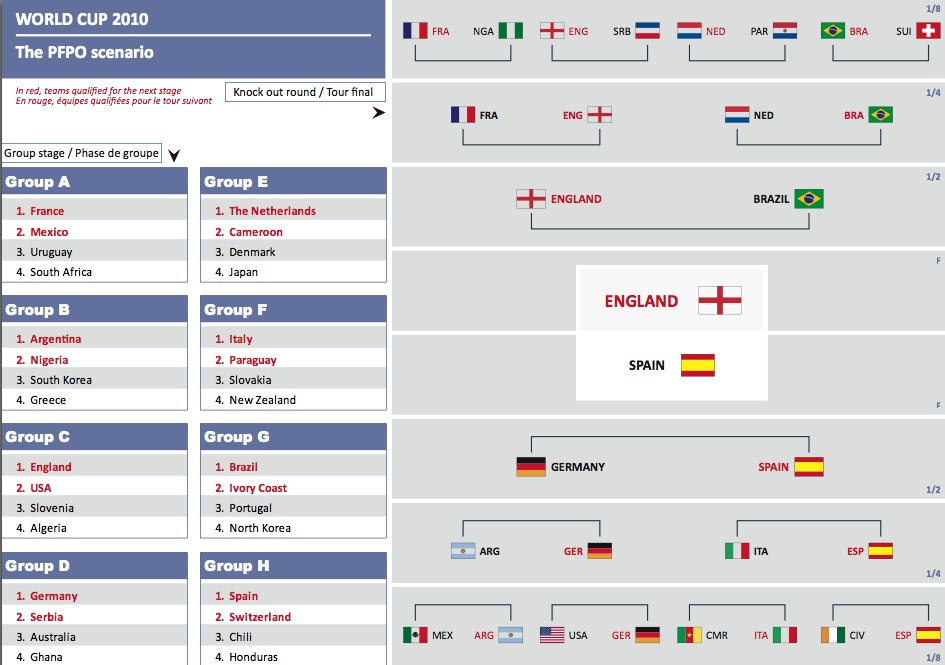- 0
By Nick Harris
8 June 2010
England will reach the World Cup final and beat Spain to lift the trophy, according to predictions based on the ages of the 32 squads and five other key “indicators” identified as being influential at previous events.
The predictions have been made by the Professional Football Players’ Observatory (PFPO) in Switzerland and are revealed today on that organisation’s website and in the graphic below.
The team at PFPO, led by Dr Raffaele Poli, analysed the common factors in successful World Cup teams in the last six events dating back to 1986.
The number of players aged 27 to 31 in a squad was a key indicator. One theory behind its importance is that players are considered to peak in this age bracket, and the more players you have in a squad – or on the pitch – at their peak at one time, the better.
“There are a lot of indicators and we consider them all, but on this indicator alone we found that in every World Cup final since 1986, the team with the greater number of players in this age bracket won the Cup,” Poli told sportingintelligence today.
The other five indicators considered are:
- the percentage of players in each squad having already taken part in a World Cup finals.
- the number of players in each squad employed by top-10 European club (as defined by the PFPO’s own coefficient).
- the number of players in each squad employed by clubs in the “big five” leagues, aka the top divisions in England, Spain, Italy, Germany and France.
- the percentage of squad players who played in at least 25 league matches for their clubs in the 2009-10 season.
- the percentage of squad players who played in at least 25 league matches per season in the “big five” leagues.
The PFPO “played” each match in the 2010 World Cup according to a formula based on the six criteria to come up with group winners France, Argentina, England, Germany, the Netherlands, Italy, Brazil and Spain. These eight nations will, according to the analysis, respectively beat Nigeria, Mexico, Serbia, the USA, Paraguay, Cameroon, Switzerland and the Ivory Coast to reach the quarter-finals.
England will then beat France, Brazil will beat the Dutch, Germany will beat Argentina and Spain will beat Italy. England will beat Brazil in the semis, as Spain beat Germany to face them. England will win.
“The goal is to let loose our theoretical knowledge and see how it fares on the often unpredictable reality of the pitch,” says Poli. “Our analysis shows that the favourite teams are England and Spain. We wish everyone an exciting World Cup and may the best team win.”
The PFPO is a research group made up of academics from the International Centre for Sports Studies (University of Neuchâtel), the THéMA Laboratory (University of Franche-Comté) and the Sports Science Institute (University of Lausanne).
It was set up in 2006 to develop statistical indicators to monitor the development of the European labour market for footballers, and works with partners including France Football, Fifa and Uefa to conduct research and study into different areas of the game.
.
More stories mentioning the World Cup
Sportingintelligence home page for all our latest exclusives
Find out what the world’s top sportsmen REALLY earn, in our database, and in our Global Sports Salaries report
.
Graphic source: PFPO







